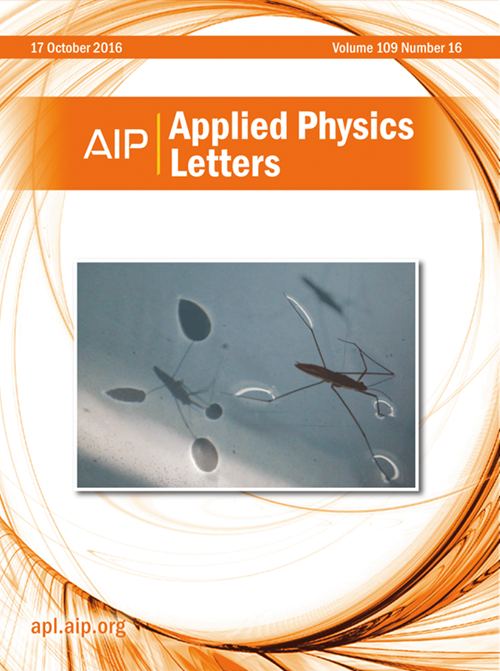Two-photon upconversion photoluminescence in CsPbBr3 nanoplates
IF 3.5
2区 物理与天体物理
Q2 PHYSICS, APPLIED
引用次数: 0
Abstract
The utilization of solar energy by light conversion processes in both natural and artificial photosynthesis systems has become a pivotal means of sustaining a consistent power supply for our daily lives and production. In general, these reactions rely on the visible spectra region where the sun produces abundant energy according to the black body's emission. Further expanding the adoption of the near-infrared (NIR) spectral region through upconversion has become an intelligent strategy to improve the entire utilization rate of solar energy. In this work, the two-photon upconversion (TPUC) properties were discovered in CsPbBr3 nanoplates (NPs) emitted at 450 nm, and a sub-gap energy level was observed to serve as the center to facilitate the upconversion process. The excitation threshold for TPUC is drastically lower than that for the two-photon absorption, another nonlinear upconversion path that requires strengthened excitation power. Moreover, a significant negative correlation between the excitation threshold for TPUC in the CsPbBr3 NPs and the exciton binding energy was unveiled, which could be attributed to the enhanced quantum confinement effects. Our work paved the way for a feasible way to expand the utilization of the NIR spectral region in light conversion applications.CsPbBr3 纳米板中的双光子上转换光致发光
通过自然和人工光合作用系统中的光转换过程利用太阳能,已成为我们日常生活和生产持续供电的重要手段。一般来说,这些反应依赖于可见光谱区域,在该区域,太阳会根据黑体的发射产生丰富的能量。通过上转换进一步扩大近红外光谱区的采用范围,已成为提高太阳能整体利用率的一种智能策略。本研究发现了 CsPbBr3 纳米板(NPs)在 450 纳米波长下发射的双光子上转换(TPUC)特性,并观察到一个亚间隙能级作为促进上转换过程的中心。TPUC 的激发阈值大大低于双光子吸收的激发阈值,而双光子吸收是另一种需要加强激发功率的非线性上转换途径。此外,我们还发现 CsPbBr3 NPs 中 TPUC 的激发阈值与激子结合能之间存在明显的负相关,这可能归因于量子约束效应的增强。我们的工作为扩大近红外光谱区在光转换应用中的利用铺平了道路。
本文章由计算机程序翻译,如有差异,请以英文原文为准。
求助全文
约1分钟内获得全文
求助全文
来源期刊

Applied Physics Letters
物理-物理:应用
CiteScore
6.40
自引率
10.00%
发文量
1821
审稿时长
1.6 months
期刊介绍:
Applied Physics Letters (APL) features concise, up-to-date reports on significant new findings in applied physics. Emphasizing rapid dissemination of key data and new physical insights, APL offers prompt publication of new experimental and theoretical papers reporting applications of physics phenomena to all branches of science, engineering, and modern technology.
In addition to regular articles, the journal also publishes invited Fast Track, Perspectives, and in-depth Editorials which report on cutting-edge areas in applied physics.
APL Perspectives are forward-looking invited letters which highlight recent developments or discoveries. Emphasis is placed on very recent developments, potentially disruptive technologies, open questions and possible solutions. They also include a mini-roadmap detailing where the community should direct efforts in order for the phenomena to be viable for application and the challenges associated with meeting that performance threshold. Perspectives are characterized by personal viewpoints and opinions of recognized experts in the field.
Fast Track articles are invited original research articles that report results that are particularly novel and important or provide a significant advancement in an emerging field. Because of the urgency and scientific importance of the work, the peer review process is accelerated. If, during the review process, it becomes apparent that the paper does not meet the Fast Track criterion, it is returned to a normal track.
 求助内容:
求助内容: 应助结果提醒方式:
应助结果提醒方式:


